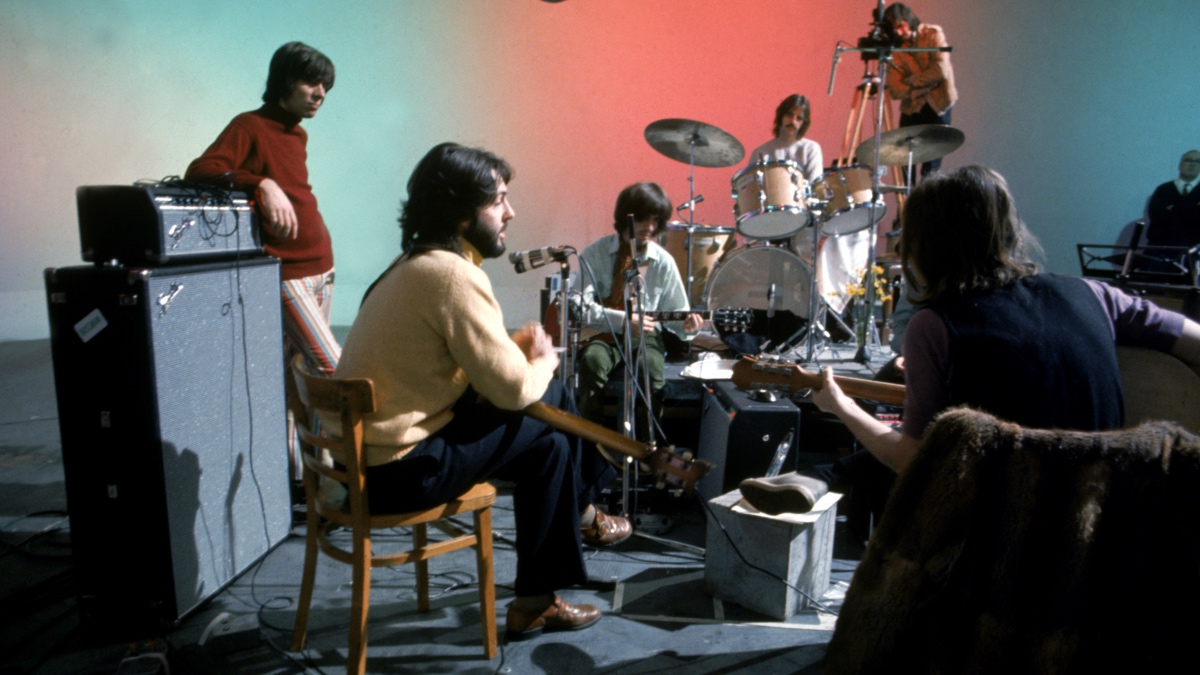Almost fifty-five years since its original theatrical release and four decades since it was last available for home viewing, Let It Be, the documentary following the making of The Beatles’ last-ever studio album, is now available on streaming for the first time.
While the documentary received mixed reviews at the time, Let It Be is considered by fans as essential viewing in understanding the final year of the band, as it captures the Fab Four’s growing creative differences between studio sessions and a final rooftop concert over the course of January 1969 – a year before their breakup was formally announced.
The Beatles also won an Academy Award for Best Original Song Score, arguably making them the only band that could possibly achieve EGOT status in the future. The band also has seven Grammys, as well as an Emmy Award for Outstanding Documentary or Non-Fiction Series, awarded in 2022.
Whether you saw the original 1970 release or are keen to check out this missing piece of the puzzle, here’s where you can watch the documentary, and how it relates to its sister documentary, 2021’s The Beatles: Get Back.
Where to stream Let It Be, the Beatles documentary first released in 1970
Let It Be is available exclusively to stream on Disney Plus from May 8th, 2024. The movie will be available free for all subscribers, as is the case with the streamer’s previous Beatles documentary, Get Back.
The film may later become available on Blu-Ray and DVD for those who want physical copies, as was the case for the latter film, but so far, no date has been announced, and Disney is currently in the midst of massively scaling back on physical media releases.
What’s the difference between the original 1970 release of Let It Be and the Disney Plus version?
It should be made clear that the Disney Plus version and the original 1970 cut of Let It Be are the same movie directed by Michael Lindsay-Hogg, but are two different editions of the film. The 2024 edition doesn’t make any cuts to Lindsay-Hogg’s final edit – although there is a huge contrast visually.
The newest version, the only one available on digital platforms, is in 4K Ultra HD, with the aid of director Peter Jackson, who worked on restoration for his own Beatles documentary. The original film was released on 35mm film for theatrical release, but was initially shot on 16mm by Lindsay-Hogg.
Let It Be’s 2024 version uses Jackson’s MAL restoration technique – named after The Beatles’ dedicated roadie, Mal Evans, which was initially developed for Get Back. According to Jackson’s interview with The Los Angeles Times, MAL utilizes an “artificial intelligence algorithm using machine learning” to clean up grainy footage from 1969 to give it its 4K quality and re-colorization.
The Disney Plus version of the documentary, does, however, have an added introduction depicting a conversation between Michael Lindsay-Hogg and Peter Jackson, laying out the differences between Jackson’s Get Back and the 1970 documentary, re-contextualizing the new release for modern audiences. Jackson’s Get Back footage contains depicted persons (mostly members of the Beatles) referencing the fact that Lindsay-Hogg is filming a documentary, which would later become Get Back the following year.
How does Let It Be differ from the 2021 Disney Plus documentary Get Back?
As acknowledged by Peter Jackson in the new introduction for Let It Be, the making of the 1970 documentary is at the center of his own documentary. At nearly eight hours of footage compared to Let It Be’s 80-minute runtime, Get Back is a much more in-depth look at the making of what would become the album of the same name – as well as the final ever studio album released by The Beatles.
With that, Get Back is arguably a more honest, warts-and-all depiction of the band’s final years, including guitarist George Harrison’s temporary departure from the band, as well as heated discussions over Yoko Ono’s presence in the studio, and a scrapped plan for a TV concert special, which would eventually become The Beatles’ iconic rooftop performance.
It’s not all bad, however – Paul McCartney admitted in 2021 that the Get Back documentary “saved his life”, and that it re-contextualized what was depicted as a controlling McCartney in Let It Be – something he received major criticism for at the time of the original documentary’s release. The scenes that depicted a creative conflict between McCartney and Harrison in Let It Be were highlighted as the main cause of this narrative, one that would influence a long-held narrative that Paul was responsible for the demise of The Beatles.

